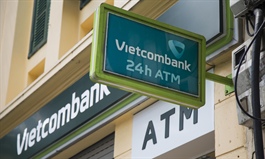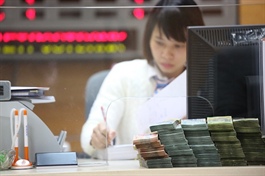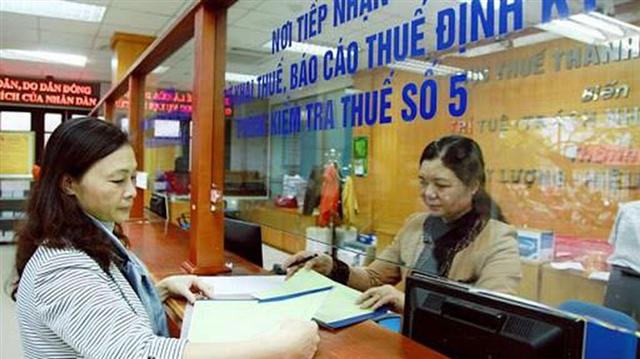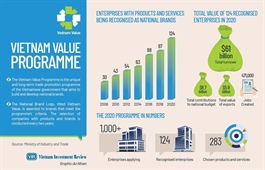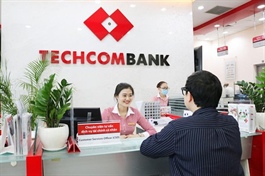Bankers are the leaders in ESG criteria implementation
Bankers are the leaders in ESG criteria implementation
Implementing and meeting environmental, social, and governance (ESG) criteria is not easy in the Vietnamese market. Dominic Scriven, chairman of Dragon Capital, discussed with VIR’s Thu Huong why this is one of the obstacles to mobilising and disbursing investment funds to pursue responsible investment.

Dragon Capital chairman Dominic Scriven put across his thoughts on ESG at this year’s Vietnam Listed Company Awards in Phu Quoc, photo Le Toan
|
As a large firm in Vietnam and a leader in responsible investing, what specifically has Dragon Capital done in this area recently?
Dragon Capital took the environmental, social, and governance (ESG) criteria of the International Finance Corporation as a starting point – and adapted them the conditions in Vietnam for its equity and bond investments here. According to current development trends, when investing capital, we must assess both financial and non-financial risks.
In the last two years, the global market has often specifically mentioned issues of climate change, reducing carbon emissions, and affecting the ecological environment and ensuring biodiversity. These are obvious concerns. People are starting to worry about climate change, and more and more regulatory recommendations are being proposed by policymakers to analyse and disclose negative impacts on their operations on climate change.
Previously, enterprises were pressured by the public and investors, and now the pressure is expanding to policy makers and managers as well. For example, when a company is listed in London it is required to disclose the amount of CO2 emitted from its operations. And there is a separate website on the Hong Kong Stock Exchange for investors to access and learn about the emissions of every listed company.
The pressure is growing and it is coming from many sides now, including capital investors, the public, and the competent authorities. Earlier this year, Dragon Capital addressed how to answer those questions in our portfolios.
What issues need to be taken into account in regards to ongoing climate struggles?
When assessing potential risks from climate change, we sign a contract with a company which has operations in Hong Kong, Singapore, and India to use NASA’s database to assess these risks in Vietnam.
For example, when investing in a hotel in Hoi An, or in a factory vulnerable to climate change, there are three main issues that need to be addressed.
These are physical risks, including estimates of assets, land and infrastructure losses caused by sea level rise, and storms and flooding; transition risks, the costs of transitioning from the high-carbon economy to a low-carbon economy; and liability risk – the possibility that investors may claim compensation for the damage they suffer from climate change.
We also have a contract with a company to evaluate the greenhouse gas emissions of the companies that we invest in, and compare these with the emissions of companies in the same industries worldwide to apply equivalent standards for the assessment. We found that Circular No.115/2015/TT-BTC from 2015 and the annual report promulgated with this circular, had new additions that require listed companies to disclose their total greenhouse gas emissions, both direct and indirect, as well as sharing initiatives and measures to reduce them.
We hope that this regulation will be implemented soon, because it is impossible to fully assess emissions if enterprises do not have the assessment tools. The issue of ensuring biodiversity is a bit more complicated. We are discussing with a number of scientists in Vietnam and abroad how to measure the impact on biodiversity and ecosystem services in companies’ operations.
While waiting for basic solutions, what is your evaluation on responsible investment criteria?
Applying ESG principles has resulted in Dragon Capital having to cut the market capitalisation of the investable portfolio by 20 per cent. Our fund managers would of course prefer to have a broader range of investment options, but adopting ESG standards requires them to meet the different criteria simultaneously.
Before making an investment decision, the fund managers get answers to a list of questions, through interviews with management, in order to evaluate companies. Investment conditions will be not satisfied if the information is not fully covered.
What is the most difficult aspect of disbursement in determining a portfolio which fully meets the criteria?
The most difficult problem for us right now is related to banking stocks, as very few banks publish the ESG implementation standards that they apply to their loan portfolios. We have seen ACB apply ESG for a few years, and some other banks are starting to pay attention to this as well. But the vast majority of other banks have not paid attention to the issue of ESG.
We suggest banks to assess the ESG impact of a project or a company before deciding to make a loan. Banks should have policies towards green finance, to reduce projects with high carbon emissions, or the ones which affect the environment and biodiversity. This information needs to be made public so that it can be assessed by all concerned parties.
If banks are leaders in applying ESG standards to their loan portfolios, the spillover effect on promoting sustainable development in Vietnam would be huge. That is a common goal for all of us.
|
Dang Van Thanh-Chairman Vietnam Accounting and Auditing Association
To maximise business performance, company leaders are not only interested in promoting business activities to increase revenues, reduce costs, and increase profits in the short term, but also step by step to focus on improving corporate governance capacity according to international practices. Improving corporate governance capacity in Vietnam is to ensure efficient exploitation of all corporate resources, create long-term sustainable value, and attract and use investment capital and human resources effectively. In the market economy, there is increasing awareness of the role of corporate governance, especially those listed on the stock market. Nguyen Tuan Anh-Deputy director Hanoi Stock Exchange
The improvement of the board of directors’ operational capacity and efficiency is of great significance to most Vietnamese companies in the case that the overall roles and responsibilities are currently ranked at the lowest level, according to the overall rating of the scores of six ASEAN countries, including Vietnam. This is a concern and one of the top investment decision-making criteria for institutional investors, especially in responsible investment funds. Other factors such as business ethics environment, corporate culture, and leaders’ integrity have also been an important consideration, in addition to deciding sustainable development for companies in Vietnam. Nguyen Nguyet Anh-Corporate governance officer, IFC Vietnam
Sustainable development is one of the top concerns of companies worldwide. This concept not only raises issues related to the environment, but also covers ESG. Many of us understand sustainable development is concerned on environmental issues. Meanwhile, issues related to governance are hardly mentioned, but are always important solutions for companies to use and create positive effects for themselves and the market as well. The goal of corporate governance is to build an environment of trust, transparency, and accountability – essential elements to promote long-term investment development, financial stability, and business ethics, thereby helping to promote the long-term growth of companies. |






